- Home
- Richard Adams
The Plague Dogs Page 7
The Plague Dogs Read online
Page 7
"I told you, Snitter, I told you! You think you know everything about men. I told you--"
"They were all right--they were masters. It was my head--all on fire--I couldn't see--"
"They were whitecoats--surely you know that? They were going to take you away, take you back--Snitter, are you all right?"
"I think--yes--I think so." Snitter sat down and looked doubtfully about him. "I wish the mouse would come back. I never know what to do without him."
"There are more houses further along this road--see them?" said Rowf. "That's one lot the men haven't taken away, anyhow--or not yet. Let's go down there--you'll feel better once we get among some houses."
"That cairn--Clusker--he was dead, you know," said Snitter. "I saw the tobacco man take his body out of the pen last night. He lay down, same as me--"
"When did he die?"
"You weren't there. I think it must have been yesterday afternoon, while you were in the metal water."
"What was wrong with what I did just now?"
"You mustn't rootle about in dustbins, however nice they smell. Not if masters are anywhere near. It makes them angry, for some reason. The proper thing, if you want to get food out of a man, is to go and make friends with him first, and then with any luck he gives you something. Mind you, I never had to do that with my master. I was always fed regularly. I knew where I was--in those days--oh, what's the use? But that's how you do it. You do the man before the food--not after. I'll show you, when we get to these houses."
At this moment, as they were entering Coniston, they both heard the sound of another car behind them, but still some way off. At once Rowf turned and slunk away down a nearby side-lane (or "lonnin," as the Lakelanders call them), between grey, lichened walls. After a moment Snitter followed him, in and out of the docks and goose-grass beside the track, disturbing clouds of blue-bottles and two or three tortoiseshell butterflies fluttering torpid in the autumn air. Around them grew, little by little, the smells and quiet sounds of a country town beginning the day--the soft, intermittent whirr of an electric milk-float, clinking bottles, a slammed door, a called greeting answered, smells of wood-smoke, of frying, of chickens released from the henhouse. Snitter, overtaking his friend, led the way by back gardens, yards and patches of waste land, always looking about him for some likely-looking man whom they could approach.
After some time spent in wandering, lurking, jumping garden walls unseen and dashing across open roads when there seemed no help for it, they found themselves near the left bank of Church Beck, not far from where it runs under the bridge in the centre of the town. The beck was loud, running strongly after the night's rain, carrying down its rocky bed a brown spate from the crags of Wetherlam, from Low Water, Levers Water and the eastern heights of Old Man. Rowf, giving it one look, slunk back towards the garden wall they had just scrambled over.
"Rowf, wait!"
"I'll be damned if I wait! That water--"
"Never mind the water. There's a shop full of food not far off. Can't you smell it?"
"What's a shop?"
"Oh, you know--a shop--a shop's a house, Rowf, where there's meat and biscuits and things and men who want them go and get them. Actually it's usually women, for some reason, but--oh, never mind. This one can't be far off. You're right, these houses are doing me a world of good. We'll find a master before long, you see."
Snitter, following his nose, led the way along the street and soon tracked down the shop which had wafted to him its tidings of cold meat, sausages, cheese and biscuits. It was an up-to-date grocer's, new and smart, its separate delicatessen and cheese counters conveniently arranged across the floor from the shelves of jam, shortbread, biscuits, potted meat, tins of soup, anchovies and teas in pretty packets and tins. It was not yet open, but the doors were standing ajar and a youth in a sacking apron was cleaning the tiled floor with a mop and pushing the water out on the pavement, while a young woman in a white overall was looking over the shelves and checking and rearranging some of the stock.
Snitter came to a stop on the opposite side of the road.
"Now watch me, Rowf, and remember--men first."
"Don't like men."
"Don't be silly. Of course we've got to find a man to look after us. A dog has to have a master if he's going to live properly. Poor old Rowf, you've just been badly treated by the wrong sort of men."
"It's a bad world--"
"Oh, try the other lamp-post for a change. Come on! This is going to teach you a thing or two. You'll like it."
Snitter ran across the road and put his head between the open doors. The young man in the sacking apron, looking up, saw his black cap, backed by the shaggy bulk of Rowf behind him. He stood staring a moment, then laid his mop aside and called over his shoulder into the recesses of the shop.
"Eh, Mr. T.!"
"What's oop?" replied a voice.
" 'Ave y'ever seen dog owt like this? It's got cap on! Theer's two on 'em tryin' to coom in, like. Seem to know wheer theer at an' all. Are they owt to do wi' thee?"
At talk of dogs on his premises the proprietor, a conscientious and fastidious man, who was washing his hands with disinfectant soap as part of his normal routine before opening shop, dried them and came hurrying forward between the shelves, buttoning his clean, white, knee-length shop coat as he went. Seeing, in passing, the ham knife lying where it should not have been on the cheese counter, he picked it up and took it with him, tapping the flat of the blade against his left hand in nervous haste.
"Where, Fred, where?" he said. "Where? Oh, I see. Good gracious, no, I've never seen them in me life. Have you, Mary? Mary? Are they anything to do with you?"
The young woman, carrying the stock sheets clipped to her fibre-board, also approached the door.
"Whatever's that on it head?" asked the proprietor, staring.
As he came into full view from behind the shelves and, hands on knees, bent down to look at Snitter, both dogs turned and pelted down the street like the hounds of spring on winter's traces. Round the nearest corner they went, past the Black Bull and up the lane beyond. After two hundred yards Snitter stopped and pressed himself against the wall, panting.
"Did you see, Rowf? Did you?"
"He was a whitecoat!"
"He had a knife!"
"He smelt of that stuff!"
"Scissors sticking out of his front pocket!"
"There was a woman whitecoat too, carrying paper, one of those flat board things they have when they come to take you away!"
"Oh Rowf, how dreadful! That must be another whitecoats' place! Perhaps the town's all whitecoats, do you think? There seemed to be hardly anyone else about. A whole town of whitecoats!"
At the thought they began to run again.
"I'm not going back there! I bet they do throw dogs into that running water, whatever you say."
"That man must cut them up on those glass tables in there. It isn't a shop at all!"
"Let's get away! Come on, we'll go up here. It smells lonely."
"Yes, all right. Why, these are rhododendrons, Rowf! Rhododendrons!"
"Never mind."
"No, I mean it's all right. I tell you, we're bound to find some proper men some time today, before we're done."
"You'll kill us, Snitter--or worse. I'd rather keep away. I never got any good from a man yet."
They were making their way up a walled lane--almost a road-skirting the hillside above Coniston. Below them, at the foot of a steep slope covered with trees and undergrowth, they could hear the big beck shouting like a mountain torrent and from time to time caught sight of its white water foaming between the rocks of the ravine. So loud, indeed, was the noise that when a lorry came jolting towards them round a bend in the lonnin they were startled, having heard nothing.
Snitter, whining with terror, crept into the bracken and hid himself. Rowf, however, dashed at the wheels, and ran snapping for some distance behind the lorry before coming back to the place where they had first seen it. The back was
open, with chains on its metal sides which clanked and slapped as it swayed along; and evidently loaded with wet gravel or stone spoil, for Rowf's black muzzle was daubed with a yellowish, ochreous sludge which had run out of the back. He sat on his haunches, wiping at his face with one front paw. Snitter emerged from his hiding-place and came back to him.
"What's the matter? I thought you said men--"
"A lorry, Rowf!--"
"I chased it away all right! Damned thing, it shat all over my nose--it must have been terrified, grrrrrr-owf!"
"Lorries--the--the blood!--they shut me up--don't do it any more, Rowf! You won't?"
"What a strange beast you are, Snitter! One moment you're--"
"I know what I'm talking about. Yes, I'm mad all right, but it's only the wind. It blows through my head, you know, where the brains used to be. Once the flies get in--"
"They won't. Let's get on. Wherever that lorry came from there might be some more men--better ones, you say. I doubt it myself, but if that's what you want to find so much--"
Soon they came to the heavy waterfall below Miners Bridge and now it was Rowf who sheered away at sight of the falling water.
"It's all right, Rowf. There aren't any whitecoats here--"
"How do you know?"
"Smell."
"I don't care--I'm not going down there."
From some distance beyond the fall they could now hear the grinding of a lorry in low gear and the intermittent rattling, sliding and hissing of stones being loaded. They went cautiously on. Stronger than the smells of diesel and of men, the very ground ahead of them seemed to be exuding a strange, disturbing scent; earthy, a smell of rain-washed stones bare of grass--a trampled, empty smell. Snitter seemed half-attracted and half a prey to misgiving. They came to a smaller beck running beside the track and he lapped doubtfully at it, licking his chops in distaste.
"I don't know--I can't make it out. Have they taken all the grass away? Something's tainted the water--can you taste it?"
"It's metal. I should know. You stay here, Snitter. I'll go and have a look round. If I come back running, don't hesitate--just follow me as fast as you can."
Rowf scrabbled up a nearby pile of stones and disappeared. A few moments later Snitter, hearing him bark, followed. Together they looked in astonishment across the wide hollow among the hills to which they had climbed.
The entire area ahead was void of vegetation, rocked and cratered as the moon. Across it stretched a track, where rainwater glistened in deep ruts, and beside this a cloudy stream ran in a kind of trough. Brown mud lay everywhere, and in the distance a pile of shale rose like a giant's unlighted bonfire. Far off, across the waste, a dirty lorry crept, rocking and splashing. As the two dogs watched, it backed slowly towards the pile, in obedience to a man in a yellow helmet who shouted, gesturing first with one hand and then the other. Somewhere out of sight the engine of a pump was put-putting steadily and they could see, dark against the tawny ground, the line of a thick, black hose, its spout discharging into the stream.
This was Coppermines Valley, once a mining site but now, its lodes long worked out, frequented only for small-scale winning of gravel and spoil by anyone who cared to bring a lorry; hence the activity on a Saturday morning. It was a scene of squalid desolation, of ragged spoil heaps and other debris of abandoned industry. In all directions across the disfigured landscape, channels, raw and man-made, ran like millraces, streaming down steep slopes or cutting unnaturally over patches of encroaching fell. A long way beyond, the hillsides resumed their crags and bracken, from which the breeze carried faint, mossy odours, partly occluded by the nearer smells of the workings.
The two dogs gazed for some time in silence.
"That explains it, of course," said Snitter at length.
Rowf scratched the back of one ear with a hind paw and scrabbled uneasily at the ground.
"That explains it, Rowf, don't you see? This is the part they're making now. They've just finished taking away all the streets and things and they're starting to put in the big stones and grass. When they've finished here I suppose they'll go lower down, to those houses we've come from; take them away and make that place into rocks too. But why? Especially if the houses belong to whitecoats? I can't make it out at all. There's no sense in it, and you can't even get out of the wind." Snitter shivered and lay down.
"Out of the wind? It's the world we can't get out of."
"These may be the wrong sort of men too. They don't look much like masters to me, but all the same I'm going to try. What else can we do?"
Leaving Rowf sniffing the pungent, bitter scent of brown ants scurrying over their mound, Snitter ran quickly across the waste, splashed his way through half a dozen great puddles between the piles of shale and, wagging his tail, approached the driver of the lorry, who was kicking moodily at one of his front tyres. As the driver caught sight of him he stopped uncertainly, half-afraid and turning as though to make off. The driver, straightening his back, shouted over the bonnet to the man in the yellow helmet.
"Eh, Jack, 'ast seen yon afore? Whose is it, d'y know?"
"Nay. No dog 'ere. Nowt to do wi' place, like. What's yon on it head?"
"Dunno. Git away-aym! Goo on, get off, y' boogger!" shouted the driver, picking up a stone. Snitter turned and ran as he threw, missed and returned to his kicking of the tyre.
Rowf looked up from the anthill.
"What?"
"He was kicking the lorry--he was angry before I came; I could smell that."
"I suppose they must make the lorries run about in that place-tie wires on them, push glass things into them--all that. D'you remember Kiff told us they used to tie wires on him to make him jump?"
"They wound a cloth round his leg, he said, and pumped it tight with a rubber ball-thing. These are the wrong sort of men--"
"All men--"
"All right," said Snitter sulkily. "I admit I was wrong, but I haven't given up yet. We must go and look for some other men, that's all."
"Where?"
"I don't know. Let's go up that hill over there. It's in the opposite direction from the whitecoats' town, anyway."
They loped across the bare ground, past the old youth hostel hut and the millrace beyond, splashed through Levers Water beck and began to climb, on the line of Low Water beck, into the high wilderness on the eastern slopes of the Coniston range. The wind freshened, its sound in the heather rising at times to a shrill whistling, and carried the clouds continually across and away from the sun moving on towards noon, while their shadows, with never a sound, flowed down the slopes faster than swallows or drifting rain. Among the stones nothing moved. Further and higher into this solitude, with many halts and pauses, the dogs hesitantly ascended as the morning wore on. More than once, topping a slope or rounding a boulder, they came unexpectedly upon a grazing yow, and as she made off chased her, barking and snapping at her heels for forty or fifty yards until they lost interest or some other scent distracted them from pursuit. Once, not far away, a circling buzzard closed its wings and dropped into the grass. Some small creature squealed, but before they reached the place the buzzard rose again with no prey to be seen in beak or talons. Rowf watched it turn into the wind and slide away.
"Better not fall asleep here."
"Not in the open, no. Snippety-snap--don't bother to open your eyes--you haven't got any." Snitter's short legs were tiring. He lay panting on a patch of smooth turf littered with sheep's droppings while Rowf, in curiosity, cast unsuccessfully about for traces of the buzzard's victim.
Still climbing, they crossed a green path and above it the stream became yet more narrow, with many shallow falls into brown pools overhung by glistening patches of liverwort and tussocks of grass fine as horsehair. The ascent grew steeper until, reaching at last the lip of yet another hanging valley, they came all unawares upon Low Water, that still and secret tarn that lies enclosed under the precipices of Old Man and Brim Fell.
Rowf, leading the way past strange, pillar-like r
ocks canted upright as though set by human hands long ago, shrank back from the outfall, cowering at sight of the placid pool. In this seldom-visited place, windless and silent, the tarn and its surroundings lay as they must have lain for millennia past, unchanged by any accident or act of man. Through the limpid, grey-green water, perhaps a hundred and fifty yards across and nowhere more than a few feet in depth, could be seen clearly the stones of the bed, streaked here and there with a peaty silt. On the further side, the screes of Old Man fell sheer into the rippleless shadows, the mountain, rising nine hundred feet to its summit, shutting off half the sky above. In the unexpectedness of the tarn's disclosure, and the stillness of its stones and water, there seemed a kind of malignant vigilance--the cold assurance of one who, in silence, watches a fugitive or culprit unawares, waiting without haste for the moment when he will turn and look up, to learn from that impassive face that flight or concealment is useless and that all that he supposed secret has been observed and known from the first.
With a howl of dismay, Rowf fled up the slope towards Raven Tor. Snitter overtook him in a stony gully and he turned on him, panting and snarling.
"I told you, Snitter--I told you, didn't I? It doesn't matter where we go. The whitecoats--"
"Rowf, there's no one there--nothing--"
"You never saw the tank-it's just like that--in fact that is a tank, only a bigger one--the water doesn't move--you can see right down into it--then they pick you up--"
As some honest soldier might find his straightforward, workaday warmth and staunchness no match for the onset of shell-shock in a comrade, so Snitter, his desire to reassure overwhelmed by Rowf's vehemence, lay down without further talk, feeling against his own body his friend's tension and fear. After some time Rowf said, "I suppose they must be waiting somewhere--the whitecoats. Where do you think they're hiding?"
"It's not for us--not that water--it's too big--they must have made it for some bigger animal--" Snitter, unable to explain away the sudden and unforeseeable appearance of the tarn and almost convinced by Rowf's terrified certainty, was nevertheless still searching for some kind of reassurance.

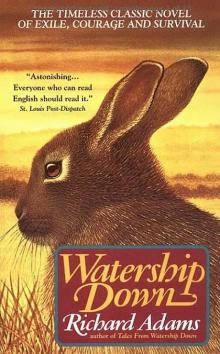 Watership Down
Watership Down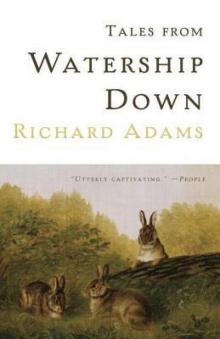 Tales From Watership Down
Tales From Watership Down Maia
Maia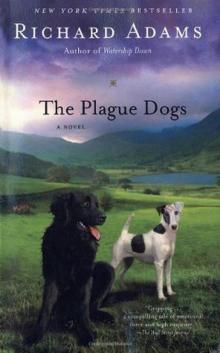 The Plague Dogs
The Plague Dogs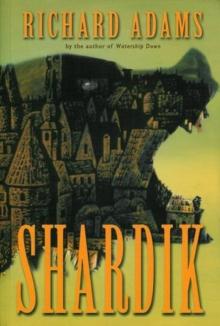 Shardik
Shardik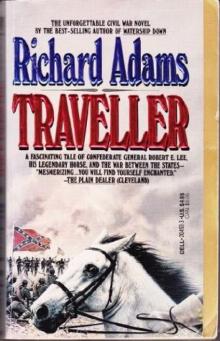 Traveller
Traveller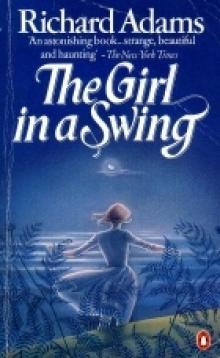 The Girl in a Swing
The Girl in a Swing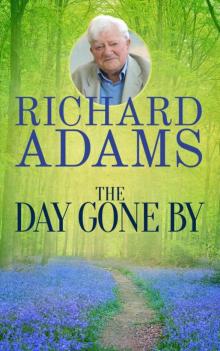 The Day Gone By
The Day Gone By Daniel
Daniel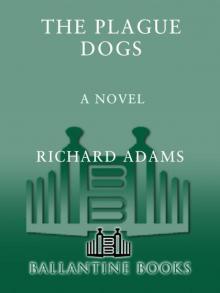 The Plague Dogs: A Novel
The Plague Dogs: A Novel